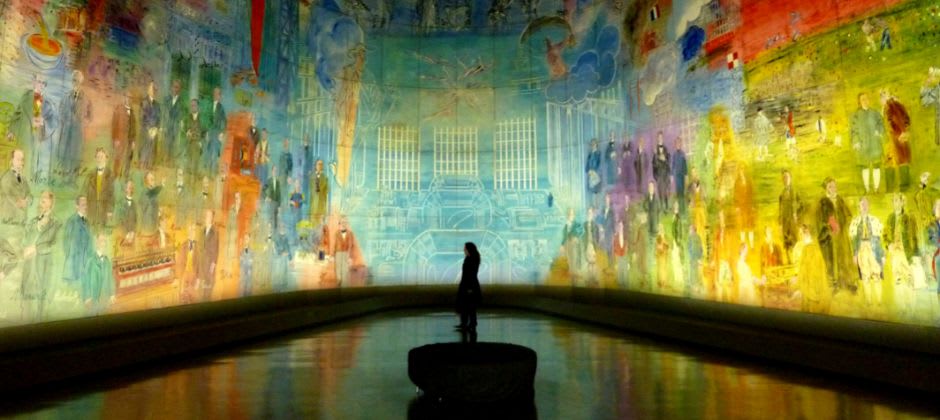Study History: The Ultimate Student Guide (2024)
- Subject Guides
- Humanities

SCHOLARSHIPS | STUDENT RESOURCES | MORE SUBJECT GUIDES
If you have a passion for learning about how societies formed, developed, and evolved through many historical epochs, then a Bachelor's degree in history could be just what you're looking for. On the other hand, if you've already completed your studies, and are now left wondering "What can I do with a history degree?" or "Should I pursue a Master's degree in history after my undergraduate studies?", then this guide may help you.
From ancient and classical civilizations to modern times, what makes history so interesting is its broad range. You can study how politics, social sciences, philosophy, religion and other areas developed over time, or you can choose to specialize in hyper-specific topics like the history of a particular region or period in time, or focus on different aspects such as art, literature, and music of specific eras. No matter who you are or where your passions lie, there is a subfield of history that is bound to pique your interest.
In this guide:
- What is a history degree?
- Areas of history you can study
- How long does it take to get a history degree?
- Why study history abroad?
- Careers in history
- History graduate salaries
- Tips for choosing a history degree
- Advice from history graduates
- What to ask universities about their history programs
- What to look for in a university when looking for history programs
- History accreditations for universities
- Popular universities for studying history
Find a history degree in your dream destination
Find & compare history degrees from universities around the world!
What is a history degree?

A history degree is an academic major focused on the study of past events and people.
If you're looking to get a Bachelor's degree in history, you can expect to learn about many different topics, such as American history, European history, Asian history, gender history, politics, economics, sociology, and more. On the other hand, a Master's degree in history and PhD degree programs are more specialized and tend to have narrower fields of research, which will depend on your interests and your institution's resources.
What makes history degree programs so valuable are their versatility; the knowledge and skills you acquire can be applied to almost any professional field after graduation. You can expect to develop strong research skills, and the degree also provides you with analytical and critical thinking skills that are essential for success in any job or role.
Which areas of history can you study?
History is a broad and fascinating field, and there’s no doubt that it can open up many different paths. Many students and graduates eventually start asking questions like "What can I do with a history degree?", or "What programs should I apply for in order to get a Bachelor's in history?", and, while the answers to these will depend on a variety of factors, examples below can help point you in the right direction.
If you're still undecided on which specialized degree program you'd like to apply for, you may benefit from getting a general history degree. These will give you a wider perspective of different historical periods, and they often include plenty of interdisciplinary courses which helps you develop your critical thinking and analysis skills.
If you would like a degree that gives you an in-depth overview of a particular historical period:
Delve into a range of historical time periods, from Ancient Greece to Persia.
Ideal for those with a passion for learning about medieval times, spanning from the fall of the Roman Empire to the Renaissance.
Study the history after the Middle Ages, examining significant events and developments in the last few centuries.
These are degrees that explore the relationship between history and other parts of society:
Explore ideas, art, architecture, literature, and media of cultures through many historical eras.
Combine your passion for history with their interest in economics by studying how economic principles changed over time.
Social History 👨⚖️
Study how experiences, ideologies, issues, and events can deeply effect people and populations.
How long does it take to get a history degree?

- Bachelor's degree in history: four to five years
- Master's degree in history: one to two years (depending on your university or undergrad credits)
- PhD/doctorate programs: four to six years (depending the institution, research focus, and your personal circumstances)
Why study history abroad?
There are many reasons why studying history abroad can be an amazing experience.
1. Get the funding and resources you need for research
Studying histoyr abroad can be a great opportunity to acquire funding and resources for your particular area of research. Sometimes your original university, or home country, don't have access to the resources you need for your specialization, and other times there are no digital archives of the historical sources and artifacts you're studying. In these cases going somewhere else is not only recommended, but may even be necessary.
2. Experience history first-hand
Why study history in the first place? It's a degree for those that have a burning passion for understanding societies and individuals of the past, learning from humanity's victories and mistakes, and how we can use that knowledge to guide us to a better future. Now take that passionate person and imagine that they're able to explore the very places where historical events took place, walk in the footsteps of historical figures, and see history-shaping artifacts and documents first-hand. It's an incredible way to connect with the past and get a deeper appreciation of it.
3. Expand your understanding of cultures
Studying abroad is a fantastic opportunity to immerse yourself in a different culture, meet new people, and broaden your perspective on the world. You'll get to experience life in a new country, try new foods, learn a new language, and make long-lasting friendships with people who are as passionate about exploring the world as you are.
4. Grow your CV/resume and career
Completing a semester or even an entire degree program abroad can also be a great way to build your resume and gain valuable skills that will serve you well in your future career. It shows employers that you're adaptable, independent, and open-minded - all qualities that are highly sought after in today's global economy.
5. Grow a network of international colleagues
By studying history abroad, you'll get an invaluable opportunity to study and research along with people who are as passionate about history as you are. The benefit of putting yourself out there and networking cannot be overstated - it not only makes your study abroad more memorable and fun, but it can also open doors to a potential job or career opportunity.
6. Learn a new language
Chances are that you'll most likely study in a country with a different native language than yours. This is a fantastic opportunity to learn and immerse yourself in that new language, as well as the culture surrounding it.
Careers in history - common history major jobs
History is a little peculiar when it comes to careers, as it’s both an extremely versatile major and very limited at the same time.
On one hand, if you’d like to work in one of the “history jobs”, that is, directly apply your knowledge of history in your work, your options may be somewhat limited to fields and career paths that make use of historical references and understanding of different time periods, such as historian jobs, archivists, museum curators, and others.
That said, studying history helps you build an exceptionally adaptable set of skills that can be transferred to any field or role. Examples of such skills are critical and comparative analysis, research, summarizing and contextualizing facts and events, quantifying information, etc. These universal skills allow you to succeed in any field, be it history-aligned or something completely different like law, business, or marketing.
So, if you're a graduate and are unsure what history major jobs are out there, pondering what jobs can you get with a history degree.
History-aligned careers
- History Professor/Teacher
- Archivist
- Museum Curator
- Heritage Manager
- Film/Theater Director
- Costume/Set Designer
- Librarian
- Academic Researcher
Roles that utilize skills you get by studying history
- Archeologist
- Lawyer
- Governmental roles
- Civil Servant
- Journalist
- Editor
- Writer
- Business Consultant (i.e. for Museums and Historical Sites)
What are salaries for graduates of a history degree?
Salaries of history graduates can vary widely, primarily based on what industry or job you end up taking - a historian salary will be much different from that of a lawyer. There are many jobs for history majors out there, but here are a few examples of different history
| Job title | United States | United Kingdom |
| Editor ✍️ | $57,253/year | £29,467/year |
| History professor 👨🏫 | $89,825/year | £75,380/year |
| Museum curator🏺 | $46,948/year | £28,966/year |
Tips for choosing a history degree

First, studying history can be incredibly rewarding, but it's not for everyone. It's important to have a genuine interest in the subject matter, and to be willing to put in the time and effort required to succeed.
We talked to history degree alumni and asked them what questions you should consider when deciding whether this is the right field for you:
- Can I afford my history studies without getting into debt?
- Do I need to travel or relocate to study the program I’m interested in?
- What is my end goal? Do I want to work exclusively in a role that will make use of my history knowledge, or am I open to different fields too?
- What are my strengths? Am I good at reading, researching, and analyzing large amounts of information? Am I good at communicating my findings? What am I not great at?
- Will I need to pursue graduate studies in order to achieve my goal?
- Should I study history as my major, or should I only take history courses as a part of a different degree major?
- Am I passionate about a specific historical period, or am I more interested in the general approach to historical research (i.e., analyzing the historical context to an art movement)?
- Does my target university have the resources and funding to provide the needed research facilities?
It's also worth emphasizing the importance of networking and building relationships with professors, classmates, and alumni. These connections can help you find internships, job opportunities, and even mentorship and guidance as you navigate your career path.
Finally, remember that a degree in history can be incredibly versatile. Don't limit yourself to traditional career paths like teaching or museum work (although those are great options too!). Your research, writing, and analytical skills can be valuable in a wide variety of fields, from law to marketing to public policy.
Helpful advice from history degree graduates
We interviewed history graduates and asked them to share their thoughts on their history program and if they have any advice to share with you. Here are some of the things they shared with us.

"Strive for a balance in your degree. You have to do a lot of reading when you're studying history, so you have to focus on what's important. A lot of history students also fall into the trap of following pre-existing data analysis systems, but I'd say it's better to develop your own system for analyzing the reading material. Lastly, communicate with professors on a continuous basis, and ask for feedback often."
- Johan, B.A. in History and Political Science from Uppsala University and Lund University

"Study what you're passionate about. I've always loved playing the violin and reading books, so I studied Music and Literature as my Bachelor. But as I went through my undergraduate degree, I figured out that what I actually loved was the history behind [them]. I love finding out why the music was written, what was going on in the world at the time, the politics of literature, and things like that."
- Elizabeth, M.A. from Central Michigan University and University of Strathclyde and PhD in Cultural History from University of Strathclyde
What questions should you ask a university to find the right history program?
Here are some of the questions that the alumni said you should bring up when talking to universities about their history programs.
- What courses will I be taking, and what topics and time periods will be covered? Are there opportunities to take courses in related fields, like anthropology or political science?
- Would it be possible to do a double Bachelor - one in history and one in another subject?
- Who will I be learning from, and what kind of expertise do they have? Are there any professors whose research interests align with mine?
- Methodology in research and analysis is really important for history, so does the program include methodology as a course?
- What forms of examination are used in the program or different courses? Are the examination methods varied or are they all based on the same principle?
- Are there any study abroad, student exchange or teaching opportunities?
- Are there opportunities for undergraduates to get involved in research projects or work with faculty members on their research?
- Are there any opportunities for independent study or capstone projects?
- Does the program have partnerships with local museums or archives, and are there opportunities for students to get hands-on experience working with historical artifacts and documents?
- What kinds of jobs do graduates typically go into, and what kinds of skills and experiences do they need to be successful? Are there any jobs for history majors that the university offers directly, or at some of their partner institutions?
- Will I be provided complete funding for PhD research, and how long will I have to wait for it?
What should I look for in a university for studying history?
If you're currently searching for a university with a great history program, there are a few things you might want to keep in mind. Here are some of them:
A strong history department
You'll want to look for a university with a department with knowledgeable and experienced faculty members who are passionate about their research and teaching. You can look up faculty profiles and research interests online to get a sense of who you'll be learning from. This is even more important for prospective graduate students - make sure that the university's professors specialize in (or are at least interested in) your research field.
Course variety
A good history program should offer a range of courses covering different time periods, regions, and themes. You'll want to look for a program that offers courses that align with your interests and that will allow you to explore new topics as well. Furthermore, try to look for a program that includes more technical subjects like methodology and academic writing - a lot of students struggle with managing the course load and the process of writing theses, so having the technical basis for these helps out a ton.
Plethora of resources
You'll want to think about the resources available to you as a student. This might include access to libraries, archives, and museum collections. A university with strong partnerships with local museums or archives could offer unique opportunities for hands-on learning.
Research opportunities
Look for a program that offers opportunities for undergraduates to get involved in research projects or work with faculty members on their research. This could be a great way to gain experience and build your skills as a historian.
Strong student union and community
Many history graduates end up teaching at the university they got their degree from. That means that you’ll want a strong student union fighting for your employment and worker rights on campus. It's also good to check if the university offers accommodation on campus, or if you'll have to find accommodation yourself.
Types of accreditation for history degrees
University accreditations are a way to measure the quality and credibility of an academic institution. Accreditation is a process by which an external organization evaluates a university to determine if it meets certain standards of quality in areas like curriculum, faculty qualifications, student outcomes, and university resources.
Having an accredited history program means that students can trust that they are receiving a quality education that meets recognized standards. It also shows employers and graduate schools that the program has been vetted and that its graduates have a solid foundation in the field of history. This is especially important if you plan on pursuing any of the history jobs we outlined above.
The most common type of accreditation you will come across is accreditation by a national or regional accrediting agency. These agencies evaluate universities and colleges to ensure that they meet certain standards of academic quality.
ENQA CERTIFICATION
European Association for Quality Assurance in Higher Education (ENQA) is an umbrella organization that works with national and regional accreditation agencies to promote quality assurance in higher education across Europe.
AHA CERTIFICATION
American Historical Association (AHA) is a specialized accrediting agency which offers a "designation of excellence" to history programs that meet certain standards of academic quality.
TEQSA CERTIFICATION
Tertiary Education Quality and Standards Agency (TEQSA) is responsible for regulating and assuring the quality of higher education degree programs in Australia.
All in all, if you're considering a history program, be sure to look for one that's accredited! It's a great way to ensure that you're getting the education you need to achieve your goals.
Popular universities to study history
ERASMUS UNIVERSITY ROTTERDAM
Location: Rotterdam, The Netherlands
Courses available in: Global History, History and Social Sciences, Economic History and International Relations, Western Arts and History, Economics of Arts and Culture, Cultural Policy
BANGOR UNIVERSITY
Location: Bangor, North Wales, UK
Courses available in: European History, Movements in Literature/Film, Modern History, Archaeological Principles & Tech, Cultural Studies
SOUTHERN UTAH UNIVERSITY
Location: Cedar City, Utah, United States
Courses available in: History of the United States, World History European History, African American History, Latin American Civilization, Gender History, Women in Ancient, Medieval, and Early Modern Europe
Ready to study history abroad?
Find & compare history degrees from universities around the world.

Keystone Team
Author
The Keystone Team is comprised of experienced educators and advisors dedicated to providing valuable resources and advice to students all over the world.
Read related articles

Study Psychology: The Ultimate Student Guide (2024)

Study Political Science: The Ultimate Student Guide (2024)
